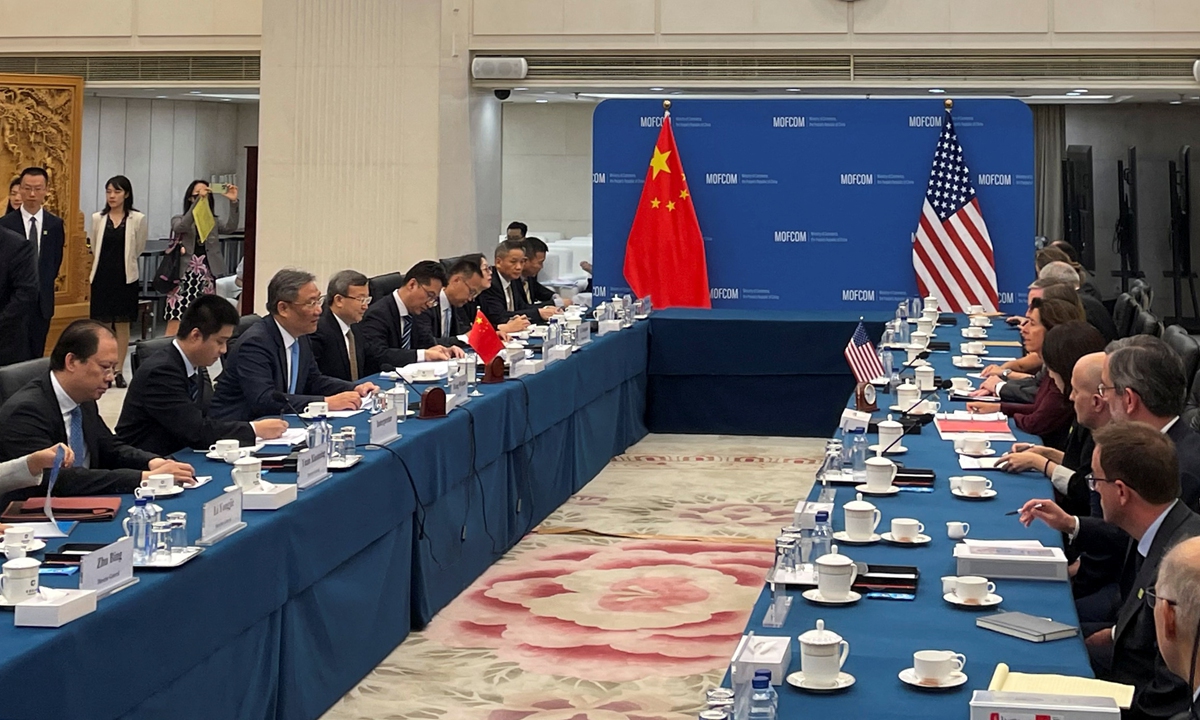
Chinese Commerce Minister Wang Wentao meets with US Commerce Secretary Gina Raimondo in Beijing on August 28, 2023. Photo:IC
China's Ministry of Commerce (MOFCOM) has given a further explanation on the results of the latest trade talks amid US Commerce Secretary Gina Raimondo's visit to China, saying the two nations' trade ministers have agreed to meet at least once a year, and will talk directly on "key issues" in a prompt, timely manner.
While emphasizing the importance of maintaining healthy China-US relations, the ministry also lodged a series of concerns over discriminatory tariffs on Chinese imports and sanctions on Chinese companies, urging the US to scrap discriminatory measures, which have seriously interfered with normal bilateral trade and disrupted the global order.
"A more detailed explanation on the meeting results indicates the two did achieve progress during talks, but a reiteration on the removal of tariffs and sanctions demonstrates a bottom line," Zhang Hong, an independent macroeconomic analyst, told the Global Times on Thursday.
It's a clear signal that China will not give in when it comes to its core interests in future dialogues, Zhang said.
China and the US agreed to establish a multi-level communication mechanism to strengthen talks on economic and trade affairs, with Chinese Commerce Minister Wang Wentao and Raimondo agreeing to maintain regular communication, discuss key issues directly in a timely manner, and meet at least once a year, the MOFCOM said on Thursday.
The multi-level mechanism includes the setting up of a joint working group, composed of officials at the deputy minister and bureau chief levels, convening biannual deputy ministerial-level meetings and inviting representatives from businesses on both sides.
The working group will focus on addressing concerns voiced by businesses from both nations, striving to collaboratively explore solutions for specific commercial issues, Shu Jueting, a MOFCOM spokesperson, told a regular press conference held in Beijing.
Moreover, a mechanism for exchanging export control information has been initiated, serving as a platform for elucidating each side's export control systems and enhancing communication. Both parties will share export control-related information in accordance with their respective laws. This mechanism is expected to facilitate mutual understanding and communication regarding export control policies, conveying the concerns of businesses from both countries, Shu said.
In addition, the two sides agreed that experts from both countries will conduct technical consultations on strengthening the protection of trade secrets and confidential business information in the process of administrative licensing, according to the official.
Commenting on the meeting results, Shu said the new communication channels that were established will provide significant platforms for the two nations' commerce ministries to conduct normal dialogue, and it's a major step in stabilizing China-US ties and promoting practical cooperation among business communities from the two nations.
Shu also mentioned that China has expressed serious concerns over issues including the US Section 301 tariffs, semiconductor policies, investment restrictions, discriminatory subsidies, and sanctions on Chinese firms.
"China stressed that a broad approach to national security hampers normal economic exchanges, and unilateral protectionist measures conflict with fair competition principles, undermining global supply chains and business collaboration," Shu said.
The remarks came after Raimondo
wrapped up her "successful and productive" four-day visit to Beijing and Shanghai on Wednesday. The US official said at a press conference in Shanghai that she did hope to "see some results" in the next few months as a result of her visit, according to a Reuters report.
American businesses - who are eager to expand in the world's second-largest economy - said they are "encouraged" to see the established dedicated channels for constructive dialogue.
"Given the significant US commercial and investment interests in China, we are appreciative of Secretary Raimondo's efforts to recalibrate this important, yet complex, relationship. The American business community in China stands ready to engage with both governments, with the goal of seeking tangible results that improve the business environment for our companies," Colm Rafferty, chairman of AmCham China said in an email statement it sent to the Global Times on Thursday.
From January to July, China's actual use of US investment surged by 25.5 percent year-on-year, according to the MOFCOM, a vivid display of global firms' vote of confidence in China even amid uncertainties.
"Some foreign enterprises, including those from the US, have voiced interest in expanding operations in China after years of engagement. However, the biggest risk for these enterprises is the heightened instability due to fraught China-US relations," Shu said.
The best way to mitigate the risks is to return to the consensus reached at the Bali Summit. This would steer the China-US economic relationship onto a healthy and stable path, leveraging the bilateral economic and trade relationship to stabilize expectations and boost confidence in trade and investment cooperation, the official noted.
"China remains committed to reform and opening-up, aiming to create a market-oriented, rules-based international environment. China's doors are opening wider, welcoming global enterprises, including from the US, to invest and partake in development opportunities," Shu said.




